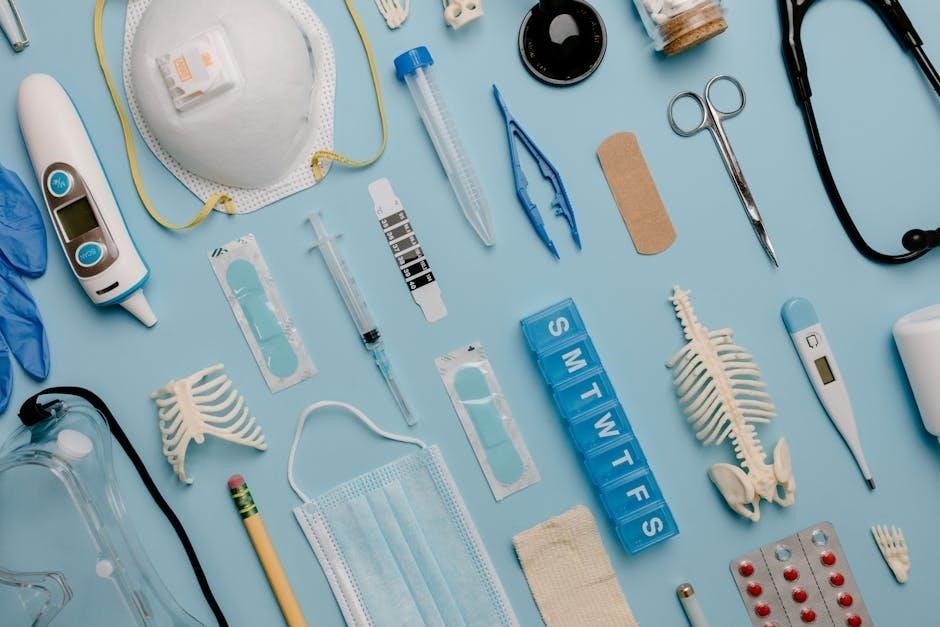The HESI Med Surg Study Guide is a comprehensive resource designed to help nursing students excel on the HESI Med Surg exam. It covers essential topics, provides practice questions, and offers test-taking strategies to ensure success. This guide is tailored to address key areas of medical-surgical nursing, making it an invaluable tool for effective preparation.
1.1 Overview of the HESI Med Surg Exam
The HESI Med Surg Exam assesses nursing students’ knowledge in medical-surgical nursing. It features multiple-choice questions covering various topics like cardiac, respiratory, and neurological disorders. The exam evaluates critical thinking and clinical judgment skills. Preparation is key, with many students using practice tests and study guides to ensure readiness for this comprehensive assessment.
1.2 Importance of the Study Guide for Nursing Students
The HESI Med Surg Study Guide is vital for nursing students as it provides targeted content, practice questions, and strategies to master medical-surgical nursing. It helps bridge gaps in knowledge, enhances retention, and builds confidence. With interactive tools like flashcards and expert tips, it equips students to excel on the exam and apply concepts clinically.
1.3 Key Topics Covered in the Guide
The HESI Med Surg Study Guide covers essential medical-surgical nursing topics, including cardiology, respiratory care, neurology, and oncology. It also addresses pharmacology, pain management, and end-of-life care. The guide emphasizes high-weight areas like gastrointestinal and genitourinary disorders, ensuring a comprehensive review. Interactive tools, such as case studies and practice questions, enhance understanding and retention of critical concepts.

Understanding the Exam Format
The HESI Med Surg exam features multiple-choice questions assessing knowledge of medical and surgical concepts. It evaluates critical thinking and application of nursing principles, with a focus on high-weight topics.
2.1 Types of Questions on the HESI Med Surg Exam
The HESI Med Surg exam primarily consists of multiple-choice questions designed to assess knowledge application and critical thinking. Questions focus on prioritization, patient care scenarios, and clinical judgment, often simulating real-life nursing situations. Additionally, some questions test the ability to analyze data and make sound decisions, ensuring preparedness for practical nursing challenges.
2.2 Content Areas Emphasized in the Exam
The HESI Med Surg exam emphasizes content areas such as cardiac, respiratory, neurological, and gastrointestinal systems. It also focuses on oncology, end-of-life care, and pharmacological interventions. These topics are considered high-weight due to their complexity and frequency on the exam, requiring a deep understanding of pathophysiology, assessment, and evidence-based nursing practices.
2.3 Scoring System and Passing Requirements
The HESI Med Surg exam uses a scoring system to assess proficiency, with levels such as “advanced” or “proficient.” Passing requirements vary by institution but typically range from 70% to 85%. Understanding the scoring system helps students gauge their readiness and identify areas for improvement, ensuring they meet the necessary thresholds for success. Consistent practice is key.

Effective Study Plan for HESI Med Surg
A well-structured study plan is essential for success. Identify weak areas, allocate time for focused review, and incorporate active learning techniques. Regular practice tests and consistent review sessions help build confidence and retention, ensuring comprehensive preparation for the exam.
3.1 Identifying Weak Areas for Focus
Start with self-assessment to pinpoint weak areas. Review practice test results and analyze performance metrics. Use flashcards for quick reviews of challenging topics. Focus on high-weight subjects like cardiology and respiratory care, which are often emphasized. Prioritize these areas to maximize study efficiency and improve overall exam performance.
3.2 Creating a Structured Study Schedule
Set specific, measurable goals and allocate time for each topic based on importance. Use a planner or digital app to organize study sessions. Dedicate blocks for practice tests and concept review. Balance study with breaks to maintain focus; Regularly review and adjust the schedule to ensure progress and stay on track.
3.3 Tips for Active Learning and Retention
- Use flashcards to reinforce key concepts and definitions.
- Engage in group study sessions to discuss complex topics.
- Practice active recall by testing yourself without notes.
- Incorporate spaced repetition to review material over time.
- Teach concepts to others to deepen understanding and retention.
- Relate new information to real-life patient scenarios for better recall.

Recommended Study Resources
The official HESI Med Surg Study Guide is the primary resource, offering detailed content and practice tests. Quizlet flashcards and supplementary materials provide additional support for comprehensive preparation.
4.1 Official HESI Study Guide and Practice Tests
The official HESI Med Surg Study Guide is crafted by exam creators, ensuring alignment with test content. It includes detailed chapters, practice questions, and answers. Regular practice tests mirror the exam format, helping students assess readiness and identify weak areas for focused review. This resource is indispensable for achieving exam success.
4.2 Best Quizlet Sets and Flashcards for Med Surg
Quizlet offers top-rated flashcard sets for Med Surg, such as “HESI Med Surg 1 Test” and “Med Surg HESI Flashcards.” These sets cover key terms, concepts, and practice questions, aiding interactive learning. Popular among students, they complement the official guide, enhancing retention and understanding of critical nursing content effectively.
4.3 Additional Resources for In-Depth Review
Beyond the official guide, additional resources like comprehensive textbooks, online tutorials, and detailed case studies provide in-depth review opportunities. Websites offering specialized flashcards and practice exams, such as “HESI Med Surg Case Studies” and “Medical-Surgical Nursing” by Lewis or Ignatavicius, further enhance understanding. These tools help reinforce complex topics and ensure thorough preparation for the exam.

Test-Taking Strategies
Effective test-taking strategies are crucial for success on the HESI Med Surg exam. These include time management, systematic approaches to questions, and techniques to eliminate incorrect answers, ensuring confident and efficient performance.
5.1 Approaches to Multiple-Choice Questions
Mastering multiple-choice questions requires strategic approaches. Read questions carefully, identify key terms, and eliminate obviously incorrect answers first. Focus on the most accurate response, considering common nursing scenarios. Practice active recall and review rationales to strengthen understanding. Regularly reviewing practice questions enhances critical thinking and familiarity with the exam format, boosting confidence and performance.
5.2 Time Management During the Exam
Effective time management is crucial for success. Allocate a set amount of time per question to avoid spending too long on one. Skim through the exam first to identify easier questions and tackle them quickly. Leave challenging questions for later and review them if time permits. Practice timed sessions beforehand to build stamina and confidence. Stay calm and focused to maximize efficiency.
5.3 How to Eliminate Incorrect Answers
To eliminate incorrect answers, read each question carefully and identify key terms. Look for distractors like “never” or “always,” which often indicate incorrect choices. Use the process of elimination to remove clearly wrong options first. Focus on the most common symptoms or treatments for the condition described. If unsure, make an educated guess based on prior knowledge or patterns observed in practice questions.

High-Weight Topics in Med Surg
Cardiac, respiratory, neurological, and gastrointestinal disorders are high-weight topics, as they are critical for patient care and frequently tested. Mastering these areas is essential for exam success.
6.1 Cardiac and Respiratory Nursing
Cardiac and respiratory nursing are critical areas, focusing on conditions like heart failure, arrhythmias, and chronic obstructive pulmonary disease (COPD). Emphasizing medications, interventions, and assessment techniques, such as monitoring vital signs and interpreting lab results, is essential. Understanding pathophysiology and prioritizing care can significantly improve patient outcomes and exam performance.
6.2 Neurological and Gastrointestinal Disorders
Neurological and gastrointestinal disorders require precise assessment and care. Conditions like strokes, seizures, and inflammatory bowel disease are emphasized. Nurses must master neurological assessments, such as the Glasgow Coma Scale, and manage symptoms like pain, nausea, and bowel dysfunction. Understanding these areas ensures comprehensive patient care and strong exam performance.
6.3 Oncology and End-of-Life Care
Oncology focuses on cancer diagnosis, treatment, and symptom management. Common cancers include breast, lung, and colorectal. Treatments involve chemotherapy, radiation, and targeted therapies. End-of-life care emphasizes pain management, emotional support, and respecting patient wishes. Understanding these areas is crucial for holistic patient care and successful exam preparation.

Case Studies and Simulation Learning
Case studies and simulations provide real-life scenarios, enhancing critical thinking and clinical decision-making skills; They help nursing students apply theoretical knowledge to practical situations effectively.
7.1 Analyzing Case Studies for Better Understanding
Analyzing case studies enhances comprehension by presenting real-life scenarios. Nursing students can apply theoretical knowledge to practical situations, improving critical thinking and decision-making skills. This method bridges the gap between classroom learning and clinical practice, preparing students for diverse patient care challenges.
7.2 Benefits of Simulation in Nursing Education
Simulation in nursing education provides a controlled environment for students to practice clinical skills and decision-making. It enhances patient safety by allowing mistakes without real-world consequences. Simulation fosters active learning, improves critical thinking, and bridges the gap between theory and practice, preparing students for diverse and complex patient care scenarios effectively.

Staying Motivated and Managing Stress
Staying motivated and managing stress are crucial for success. Set realistic goals, maintain a balanced lifestyle, and use relaxation techniques to reduce anxiety and stay focused.
8.1 Techniques for Maintaining Focus
Set clear, achievable goals and break study sessions into manageable chunks. Use active learning techniques like flashcards and practice questions to stay engaged. Regular breaks and a structured schedule help maintain concentration and reduce distractions, ensuring consistent progress toward mastering the HESI Med Surg content.
8.2 Building a Support System
Surround yourself with classmates, mentors, or online communities who understand the challenges of the HESI Med Surg exam. Regularly discussing difficult topics with peers can clarify doubts and reinforce understanding. A support system also provides motivation and accountability, helping you stay on track and share valuable resources for effective preparation.

Common Mistakes to Avoid
Avoid procrastination, last-minute studying, and overlooking high-weight topics. Poor time management during exams and not reviewing practice test results can hinder performance. Stay focused and organized.
9.1 Procrastination and Last-Minute Studying
Procrastination and last-minute studying are common pitfalls that can negatively impact exam performance. To avoid this, create a structured study schedule and stick to it. Break topics into manageable chunks, and review consistently rather than cramming. This approach reduces stress, improves retention, and ensures a thorough understanding of the material. Stay disciplined and focused.
9.2 Overlooking High-Weight Topics
Overlooking high-weight topics can significantly lower exam scores. Identify these critical areas through practice tests and review guides. Focus on frequently tested subjects like cardiac and respiratory nursing. Allocate extra study time to these sections to ensure mastery. Neglecting them can lead to poor performance, so prioritize and review thoroughly to avoid this common mistake.

Final Exam Preparation
Review notes and practice tests thoroughly. Ensure adequate rest before the exam to stay focused and calm. A well-rested mind performs better.
10.1 Reviewing Notes and Practice Tests
Thoroughly reviewing notes and practice tests is crucial for final exam preparation. Focus on high-weight topics and areas of weakness identified during study sessions. Regularly revisiting practice questions helps reinforce knowledge retention and improves critical thinking skills, ensuring readiness for the exam format and content.
10.2 Getting Adequate Rest Before the Exam
Adequate rest is essential for optimal performance on the HESI Med Surg exam. Ensure 7-9 hours of sleep to enhance memory consolidation and cognitive function. Avoid last-minute cramming and maintain a relaxing pre-exam routine to reduce stress and improve focus. Prioritizing rest supports mental clarity and readiness for the challenging questions ahead.
The HESI Med Surg Study Guide is a vital resource for nursing students, offering comprehensive content and strategies to excel. Dedication and consistent effort will lead to success and achievement of nursing aspirations.
11.1 Summarizing Key Study Strategies
Active learning, consistent practice, and a structured schedule are essential. Utilize flashcards, practice questions, and review notes regularly. Stay motivated, focus on weak areas, and employ time management techniques during exams. Engage in critical thinking exercises and seek support when needed to ensure comprehensive preparation and retention of key concepts.
11.2 Encouragement for Nursing Students
Celebrate your progress and stay resilient—nursing is a rewarding journey. Remember, every challenge overcome strengthens your skills and compassion. Stay focused, trust your abilities, and believe in your potential. Your dedication will lead to success, and the impact you’ll make in healthcare is invaluable. Keep pushing forward; you’re making a difference!























































